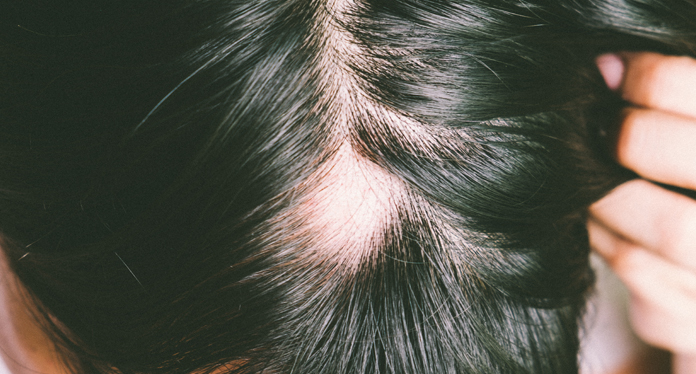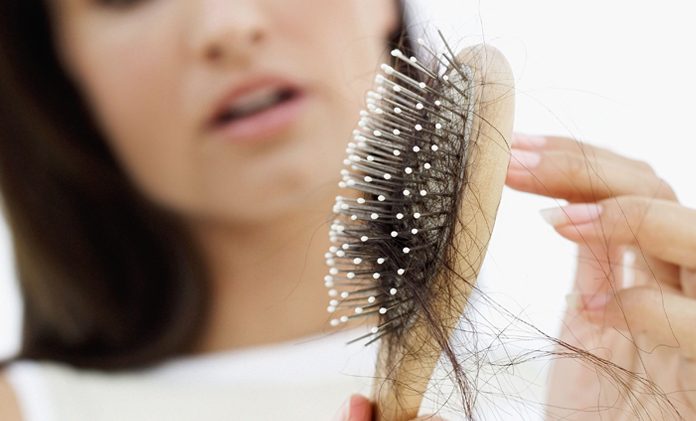Telogen effluvium or TE is the second most common hair loss problem usually diagnosed correctly by dermatologists. It occurs mainly when the number of hair follicles responsible for the growth of hair changes.
This hair loss problem significantly reduces the telogen or the resting phase of hair growth. Therefore, more dormant hair follicles will be present. This eventually leads to telogen effluvium hair loss.
However, the problem is not a permanent one, and there are several hair loss cure methods. The Telogen effluvium hair loss problem is more common among women than men.
With telogen effluvium, hair shedding or thinning hair occurs when a significant portion of scalp hairs shift into the Telogen phase or the resting or shedding phase of hair’s growth cycle. This indicates that more hairs have gone into a resting or shedding stage than what is normal.
Only fewer hair follicles can grow new hair in the Anagen or the growth phase during this time. This disturbance in the hair growth cycle slows down the hair growing process and results in shedding or thinning of hair.
Symptoms of Telogen Effluvium
TE first shows up as hair thinning on the scalp. This thinning may only be in a particular area or show up all over. It can thin out hair in many places on the scalp, and you may find that some portions are more affected than others.
Generally, it affects the crown of the head or the top of the scalp the most. TE hardly affects the hairline. But in some severe cases, pubic hair and eyebrows may also get thinner concerning density.
Causes of Telogen Effluvium
Hair loss due to TE hair loss can be triggered in several ways. Some of the common reasons for Telogen Effluvium are:
Environment
Physical trauma such as blood loss, car accidents, exposure to toxic materials and substances like heavy metals, vaccinations, surgery, etc., might trigger the Telogen Effluvium.
Due to environmental changes, we face a sudden shock which causes the hair follicles to go into a resting phase. And, when hair follicles go to that particular phase, they cannot grow normal and healthy hair.
The problems are usually not permanent, and they occur quite quickly. You may not notice much thinning until two to three months. If the environment becomes stable, the problem will soon heal and return to its normal state.
Additionally, the pollutants of the environment are also responsible for hair loss.
This type of TE generally recovers in six months. Your hair will again return to its normal state within a year.
Hormones
A sudden change in the hormonal balance can trigger the hair loss problem of TE. Like environmental issues mentioned above, the hormonal fluctuations can also lead the hair follicles to go to the resting phase for a prolonged period.
If Telogen Effluvium occurs during pregnancy, the problem will gradually disappear within a year after childbirth.
Medications or Medical Treatment
Few antidepressants and other drugs such as oral contraceptives and antihypertensive may cause hair loss problems. If you are already taking any of these medications and experiencing hair loss, it will be worth speaking to your doctor.
Doctors can analyze your symptoms better and can recommend an alternative medication. Certain surgeries and vaccinations can cause significant shock to your system and send the hair follicles to the resting phase. If you follow the doctors’ suggestions properly, your hair will grow back to its normal state with a span of a few months.
Diet
Some studies and researches have shown that the TE hair loss problem can happen due to nutrition deficiency and lack of certain essential vitamins.
In fact, the deficiency of the following may affect the hair growth problem. They are:
- Iron
- Zinc
- Vitamin B-6
- Vitamin B-12
You should consult your doctor or dietician if you plan to take vitamin supplements, which are the prime source of nutrients.
You should also follow a healthy diet with vegetables, fruits, and whole grains. Crash dieting must be avoided as it can also lead to Telogen Effluvium.

Sign of Other condition
Hair loss could be due to other conditions like alopecia areata, an auto-immune condition leading to total hair loss. Thyroid problems or fluctuations in thyroid hormones can cause hair loss problems also. Allergic contact of dermatitis from hair dyes can also lead to hair loss.
Telogen Effluvium Treatment
A fit lifestyle, nutritious diet, and over-the-counter products are the three significant steps for the Telogen Effluvium Treatment.
Detecting the problem behind hair loss is crucial. Different causes that trigger Telogen Effluvium have different ways to get treated. Keeping the hormonal levels balanced and preventing environmental issues can reduce many problems of hair loss.
Focus on Proper Diet for Nutrition
Certain vital vitamins and nutrients for hair health and growth will naturally lead to hair loss.
It is essential to go for a check-up to see whether the levels of iron, zinc, Vitamin D, etc. are adequate. Therefore, eating a balanced diet is necessary to get all the proper nutrients that you need.
Take Care of Your Hair
If you have TE, handle your hair gently when styling. Do not use blow-drying. Also, avoid curling or straightening your hair until the hair condition is improved correctly. Frequent highlighting or full colouring can damage your hair health and growth system.
Take Help from Pharmacy
Over-the-counter products may help in telogen effluvium regrowth. Always go for a product that has the content of 5 per cent minoxidil. These products are topical ones and should be applied to the scalp once each day. It helps to prolong the anagen stage that helps in hair growth.
Relax Your Mind
Sometimes hair loss can be the result of excessive stress and tension. If you are also undergoing stress and anxiety, starting with yoga and meditation is essential to relieve mental stress and calm and soothe the mind. Certain exercises are also helpful in clearing the mind and making way for coping well with the stress level.
Is there any difference between telogen effluvium and anagen effluvium?
Anagen effluvium (AE) is also another form of hair loss. However, this condition is more severe and results in drastic hair loss. One may even experience clumps of hair fall.
People who are taking cancer treatment or cytostatic drugs like antimetabolites or alkylating agents are more likely to suffer from the problems of Anagen Effluvium.
AE, just like TE, is also reversible. After stopping the chemotherapy process, it can take six months before the hair follicles resume their average growth rate. Overall, it will take at least a year before your hair gets its previous appearance again.
Always consult your doctor if the symptoms start to get worse. Doctors can detect the actual problem of hair loss and recommend the best treatment plan for it.
Telogen effluvium affects your hair less than chronic Telogen effluvium, leading to excessive and alarming shedding. Chronic telogen effluvium treatment is more difficult to perform successfully. The chronic condition of telogen effluvium may take as long as 10 years to get cured.






